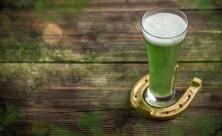’It’s a year on now and… we seem to be back where we started.’
Joe Stenson
THE CELLAR of The Temple Bar in central Dublin would normally be stacked head-high with enough kegs of Guinness to serve thousands of pints to revellers toasting Ireland’s patron saint.
But this St Patrick’s Day on Wednesday, only a smattering of empty caskets line the chilled basement of the crimson-coloured pub, the cornerstone of the capital’s drinking district.
For the second year in succession, the normally raucous celebrations have been cancelled by coronavirus curbs.
“It’s a year on now and… we seem to be back where we started,” said publican Tom Cleary, perched on a barstool next to a Guinness tap fashioned in the shape of the Celtic harp.
“It’s sad there’s no end in sight,” he told AFP. “I mean, will we be here next St Patrick’s Day with the same problems?”
St Patrick’s Day is traditionally a bonanza trading day for publicans across the Republic of Ireland.
Huge crowds heave into city centres on the national holiday, jamming pubs cheek by jowl and spilling out into the streets in an alcohol-fuelled, shamrock-themed celebration of the Emerald Isle.
But the global health emergency has brought Ireland’s most emblematic industry to a grinding halt.The first case of Covid-19 was confirmed in Ireland on February 29 last year. The government asked all pubs to cease trading after March 15 — just 24 hours before “Paddy’s Day” 2020.
In the last year, 4,534 people have died after testing positive for coronavirus in Ireland — home to just 4.9 million – and the nation is currently in the midst of its third lockdown.
As case figures waned last year, pubs in certain counties and those serving food were permitted to open for short spells.
But cases surged after the government loosened restrictions ahead of Christmas, and in early January Ireland was the most infectious nation in the world, according to Oxford University data.
All pubs nationwide have now been shut since Christmas Eve and the government said they are unlikely to reopen until mid-summer.
“We’ve endured the longest most severe lockdown in Europe,” said Donall O’Keeffe, head of the Licensed Vintners Association, which represents pubs in Dublin.
“When you’ve been closed for a year, every day is an eternity.”
In Ireland pubs and pints hold a semi-mystical status and there are signs that drinkers have sought to recreate the magic at home during the pandemic.
Irish police have raided numerous “shebeens” – illicit unlicensed bars operating below the radar while the nation has been in lockdown.
Images from one show a ramshackle setup: a wooden bar with a single tap assembled under a corrugated metal roof.
But others are more convincing stand-ins for the real thing.
One raided on New Year’s Eve even had a pool table, a woodburning stove and an arcade machine perched in the corner.
More broadly there are signs of discontent in Ireland as a third lockdown stretches on, with a sluggish vaccine rollout hampered by supply issues across the European Union.
Last month an anti-lockdown protest which drew hundreds in central Dublin turned violent.
Protesters shot fireworks at riot police who charged the crowd with batons drawn.
But the protest quickly evolved from clashes with police into a party atmosphere, with live music and drinking in the street.
Further protests are scheduled to go ahead on Wednesday, with fears that moods of merriment will be replaced by scenes of violence.
Police said “checkpoints will be in place on arterial routes into the city” with dog units, riot police, horseback officers and a helicopter unit on standby.
Outside The Temple Bar – which lends its name to Dublin’s famed “Temple Bar” drinking district – the cobbled streets are framed by desolate pubs.
Some have had their windows boarded up for months, settled in for another year of muted St Patrick’s celebrations and a long lockdown with no end in sight.
“The mood is sombre,” explained Martin Harte, head of the consortium which oversees the district.
“I don’t think anyone is thinking that we’re going to open soon and people are … fearful and unsure.”
AFP








